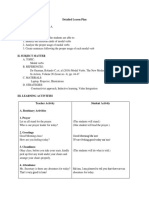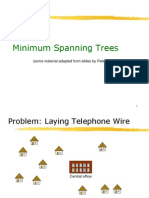3 Creating Libraries
3 Creating Libraries
Uploaded by
mdhuq1Copyright:
Available Formats
3 Creating Libraries
3 Creating Libraries
Uploaded by
mdhuq1Copyright
Available Formats
Share this document
Did you find this document useful?
Is this content inappropriate?
Copyright:
Available Formats
3 Creating Libraries
3 Creating Libraries
Uploaded by
mdhuq1Copyright:
Available Formats
Creating Libraries Class Notes
Executables can be categorized into two: Static Executables: They contain fully resolved library functions that are physically linked into executable image during built. Dynamic Executable: They contain symbolic references to library functions used and these references are fully resolved either during application load time or run time.
There are mainly two types of libraries: Static Libraries (.a) Dynamically linked libraries (.so)
Steps for creating Static Libraries: 1) Implement library sources eg.: one.c
two.c
Copyright Veda Solutions (www.techveda.org)
This is only a supplementary material to classroom sessions
2) Compile sources into relocatables $gcc -c one.c -o one.o $gcc -c two.c -o two.o
3) Using Unix static library tool archive [ar] create static library $ar rcs libtest.a one.o two.o To check the number of files in libtest.a and libtest.so, we uses the commands $ar -t libtest.a $nm -s libtest.a It will list all object files also all the functions inside the object file. In our case it will show one.o and two.o.
Thus created a static library libtest.a and in order to check this library lets write a C program test.c which calls the two functions test() and test1() in one.c and two.c. $vim test.c #include<stdio.h> int main() { test(); test1(); } Then we need to compile test.c with the static library libtest.a . Generally linker checks the default path only, but our library is in our working directory therefore while compiling we have to specify the path of our library in order to avoid undefined reference error.
$gcc test.c -o teststat ./libtest.a
Copyright Veda Solutions (www.techveda.org)
This is only a supplementary material to classroom sessions
This will create an executable teststat which is statically linked
Steps for creating Dynamic libraries: Generally relocatables are of two types Position dependent: Relocatables which cannot be shared. Position independent: Relocatables which can be shared.
First create two .c files one.c and two.c as above. Compile the sources into position independent relocatables
$gcc -c -fpic one.c -o one.o $gcc -c -fpic two.c -o two.o -fpic is a flag which is used to tell the linker as it is position independent.
Using dynamic linker creating shared library $gcc -shared -o libtest.so one.o two.o Then compile the above test.c using dynamic library libtest.so. $gcc test.c -o testdyn ./libtest.so
In both the cases output will be same. In order to understand the major differences between static and dynamic linking, we will analyze the executables using objdump tool.
$ objdump D teststat
[static executable]
This is only a supplementary material to classroom sessions
Copyright Veda Solutions (www.techveda.org)
If we analyze the main function in objdump file we could see that test function base address is given and it is called directly. $ objdump D testdyn [dynamic executable]
Here in dynamic executables main function, it is calling test@plt , (plt= procedure linkage table). Plt table is generated by linker and contains information about dynamic linking.
Copyright Veda Solutions (www.techveda.org) This is only a supplementary material to classroom sessions
Above figure shows the plt table. In that table we could find a function pointer, which derefers to our particular function test.
USE CASES Static executables occupies more disk space but it has zero initialization time. Dynamic executables consumes less disk space but it consumes n amount of cpu cycles for initialization. Static builds are preferred if executables are being built for a specific use and will be used in a resource constrained environment where initialization delays are not tolerable. Dynamic builds are preferred for easier customization, maintenance and extensions for an application.
Copyright Veda Solutions (www.techveda.org)
This is only a supplementary material to classroom sessions
You might also like
- The Subtle Art of Not Giving a F*ck: A Counterintuitive Approach to Living a Good LifeFrom EverandThe Subtle Art of Not Giving a F*ck: A Counterintuitive Approach to Living a Good LifeRating: 4 out of 5 stars4/5 (5937)
- The Gifts of Imperfection: Let Go of Who You Think You're Supposed to Be and Embrace Who You AreFrom EverandThe Gifts of Imperfection: Let Go of Who You Think You're Supposed to Be and Embrace Who You AreRating: 4 out of 5 stars4/5 (1107)
- Never Split the Difference: Negotiating As If Your Life Depended On ItFrom EverandNever Split the Difference: Negotiating As If Your Life Depended On ItRating: 4.5 out of 5 stars4.5/5 (886)
- Hidden Figures: The American Dream and the Untold Story of the Black Women Mathematicians Who Helped Win the Space RaceFrom EverandHidden Figures: The American Dream and the Untold Story of the Black Women Mathematicians Who Helped Win the Space RaceRating: 4 out of 5 stars4/5 (925)
- Grit: The Power of Passion and PerseveranceFrom EverandGrit: The Power of Passion and PerseveranceRating: 4 out of 5 stars4/5 (598)
- Shoe Dog: A Memoir by the Creator of NikeFrom EverandShoe Dog: A Memoir by the Creator of NikeRating: 4.5 out of 5 stars4.5/5 (545)
- The Hard Thing About Hard Things: Building a Business When There Are No Easy AnswersFrom EverandThe Hard Thing About Hard Things: Building a Business When There Are No Easy AnswersRating: 4.5 out of 5 stars4.5/5 (353)
- Elon Musk: Tesla, SpaceX, and the Quest for a Fantastic FutureFrom EverandElon Musk: Tesla, SpaceX, and the Quest for a Fantastic FutureRating: 4.5 out of 5 stars4.5/5 (476)
- Her Body and Other Parties: StoriesFrom EverandHer Body and Other Parties: StoriesRating: 4 out of 5 stars4/5 (831)
- The Emperor of All Maladies: A Biography of CancerFrom EverandThe Emperor of All Maladies: A Biography of CancerRating: 4.5 out of 5 stars4.5/5 (274)
- The Little Book of Hygge: Danish Secrets to Happy LivingFrom EverandThe Little Book of Hygge: Danish Secrets to Happy LivingRating: 3.5 out of 5 stars3.5/5 (419)
- The World Is Flat 3.0: A Brief History of the Twenty-first CenturyFrom EverandThe World Is Flat 3.0: A Brief History of the Twenty-first CenturyRating: 3.5 out of 5 stars3.5/5 (2272)
- The Yellow House: A Memoir (2019 National Book Award Winner)From EverandThe Yellow House: A Memoir (2019 National Book Award Winner)Rating: 4 out of 5 stars4/5 (99)
- Devil in the Grove: Thurgood Marshall, the Groveland Boys, and the Dawn of a New AmericaFrom EverandDevil in the Grove: Thurgood Marshall, the Groveland Boys, and the Dawn of a New AmericaRating: 4.5 out of 5 stars4.5/5 (270)
- The Sympathizer: A Novel (Pulitzer Prize for Fiction)From EverandThe Sympathizer: A Novel (Pulitzer Prize for Fiction)Rating: 4.5 out of 5 stars4.5/5 (122)
- Team of Rivals: The Political Genius of Abraham LincolnFrom EverandTeam of Rivals: The Political Genius of Abraham LincolnRating: 4.5 out of 5 stars4.5/5 (235)
- A Heartbreaking Work Of Staggering Genius: A Memoir Based on a True StoryFrom EverandA Heartbreaking Work Of Staggering Genius: A Memoir Based on a True StoryRating: 3.5 out of 5 stars3.5/5 (232)
- On Fire: The (Burning) Case for a Green New DealFrom EverandOn Fire: The (Burning) Case for a Green New DealRating: 4 out of 5 stars4/5 (75)
- The Unwinding: An Inner History of the New AmericaFrom EverandThe Unwinding: An Inner History of the New AmericaRating: 4 out of 5 stars4/5 (45)
- Detailed Lesson PlanDocument7 pagesDetailed Lesson PlanTrina CanizoNo ratings yet
- Elements of DramaDocument14 pagesElements of DramaFarah Malik60% (5)
- SIMATIC HMI ProTool Configuring Windows-Based SystemsDocument40 pagesSIMATIC HMI ProTool Configuring Windows-Based SystemsTamer Ahmed SalemNo ratings yet
- Sunrom Inr CatalogueDocument49 pagesSunrom Inr Cataloguemdhuq1No ratings yet
- 4 Process Control BlockDocument4 pages4 Process Control Blockmdhuq10% (1)
- BIST Using Cellular Automata As Test Pattern Generator and Response CompactionDocument4 pagesBIST Using Cellular Automata As Test Pattern Generator and Response Compactionmdhuq1No ratings yet
- Free Electrons: GR Egory CL Ement, Michael Opdenacker, Maxime Ripard, Thomas Petazzoni Free ElectronsDocument525 pagesFree Electrons: GR Egory CL Ement, Michael Opdenacker, Maxime Ripard, Thomas Petazzoni Free Electronsmdhuq1No ratings yet
- Algorithm TimecomplexityDocument45 pagesAlgorithm Timecomplexitymdhuq1No ratings yet
- Minimum Spanning Trees: (Some Material Adapted From Slides by Peter Lee)Document23 pagesMinimum Spanning Trees: (Some Material Adapted From Slides by Peter Lee)mdhuq1No ratings yet
- Deterministic Finite Automata: - A Deterministic Finite Automata (DFA, For Short) Is A Special Case of NDFA in WhichDocument33 pagesDeterministic Finite Automata: - A Deterministic Finite Automata (DFA, For Short) Is A Special Case of NDFA in Whichmdhuq1No ratings yet
- The Role of The Lexical Analyzer: Token Source ProgramDocument30 pagesThe Role of The Lexical Analyzer: Token Source Programmdhuq1No ratings yet
- FOUZIYA FARHEEN - GIS AnalystDocument3 pagesFOUZIYA FARHEEN - GIS Analystravi.tcstalentacquisitionNo ratings yet
- Poshmark Software Development InternDocument2 pagesPoshmark Software Development InternMitali MathurNo ratings yet
- CSC 301 Sem1 2021-2022 - 2 Data Structures IDocument99 pagesCSC 301 Sem1 2021-2022 - 2 Data Structures INkembeh Benjamin SC20C092No ratings yet
- Quickstart Guide: Leica GeosystemsDocument8 pagesQuickstart Guide: Leica Geosystemspedro briceñoNo ratings yet
- The Grammar of Numbers - Grammar - Peck's English Pointers - TERMIUM Plus® - Translation Bureau PDFDocument3 pagesThe Grammar of Numbers - Grammar - Peck's English Pointers - TERMIUM Plus® - Translation Bureau PDFSharon KaurNo ratings yet
- Strengthsfinder 2.0 Report: © 2000, 2006-2008 Gallup, Inc. All Rights ReservedDocument19 pagesStrengthsfinder 2.0 Report: © 2000, 2006-2008 Gallup, Inc. All Rights ReservedsimplevityNo ratings yet
- Class-7-Assessment TestDocument4 pagesClass-7-Assessment Testchinu321No ratings yet
- Created by Teaching Simply 2018Document30 pagesCreated by Teaching Simply 2018tuan minh nguyenNo ratings yet
- Aditya Gupta: ObjectiveDocument2 pagesAditya Gupta: ObjectiveAditya GuptaNo ratings yet
- NEWS For R Version 4.0.4 (2021-02-15)Document14 pagesNEWS For R Version 4.0.4 (2021-02-15)luisferxaraviaNo ratings yet
- Acer Aspire 1350 - ServiceManDocument104 pagesAcer Aspire 1350 - ServiceManJonathan LongNo ratings yet
- Chicago 15th Edition PDFDocument7 pagesChicago 15th Edition PDFSandraniNo ratings yet
- Introduction The Book of IsaiahDocument2 pagesIntroduction The Book of IsaiahHizkia SebayangNo ratings yet
- Songwriting BalladDocument2 pagesSongwriting BalladATUFA·No ratings yet
- Thesis Statement Chapter 1Document8 pagesThesis Statement Chapter 1christinavaladeznewyork100% (2)
- Fba Form 1 - Summer ParDocument2 pagesFba Form 1 - Summer Parapi-302628458No ratings yet
- Masculinist Metaphors, Feminist ResearchDocument30 pagesMasculinist Metaphors, Feminist ResearchLee Wai KeatNo ratings yet
- Article Review Sir FurkanDocument3 pagesArticle Review Sir Furkanapi-289755581No ratings yet
- Angliski Demchenko 10kl Bel Rus Ch1 2021Document219 pagesAngliski Demchenko 10kl Bel Rus Ch1 2021Anton MyslitskiyNo ratings yet
- Department of Applied Sciences (M Athem Atics) : LatticeDocument4 pagesDepartment of Applied Sciences (M Athem Atics) : LatticeDipankar SambyalNo ratings yet
- Shahih Bukhari 2501Document500 pagesShahih Bukhari 2501bozikerNo ratings yet
- Caroline Sarah Parker: What's Your Name?Document4 pagesCaroline Sarah Parker: What's Your Name?SpaceANo ratings yet
- 4 Sentence ConstructionsDocument12 pages4 Sentence ConstructionsMarcus LeanNo ratings yet
- DMS (22319) - Chapter 3 NotesDocument83 pagesDMS (22319) - Chapter 3 Notespdijgqam1nNo ratings yet
- Class IvDocument9 pagesClass IvShalini JhaNo ratings yet
- Lec 1.1Document26 pagesLec 1.1yuvrajaditya1306No ratings yet
- Comparative Rules + As As..: Not As (Adjective) AsDocument2 pagesComparative Rules + As As..: Not As (Adjective) AsCryptan VeilNo ratings yet
- 20th C English Lit Seminar Syllabus 2Document13 pages20th C English Lit Seminar Syllabus 2Gabriela VavaNo ratings yet















































































